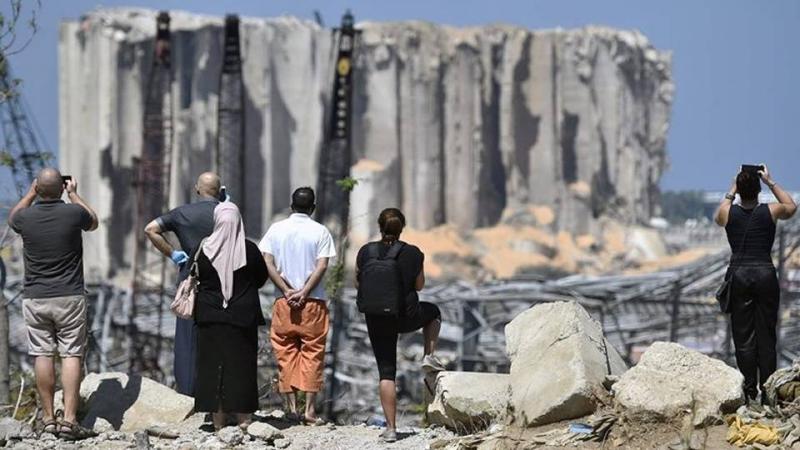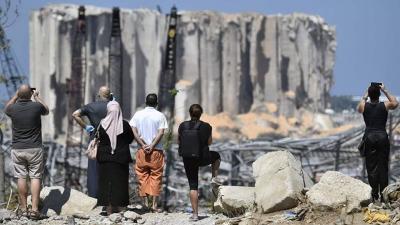The families of the martyrs and victims of the Beirut port explosion have stopped to reflect on the political pressures aimed at "sabotaging the investigation" after the request from the Minister of Justice in the caretaker government, Henry Khoury, to the Supreme Judicial Council to agree to appoint an additional investigative judge, which implicitly undermines the findings of Judge Tarek Bitar in the case. The families asserted during their protests their insistence on keeping the investigation free from political bickering and ad-hoc appointments that impede the work of the investigative judge, including decisions on bail releases in accordance with legal procedures following the release of the judicial formations previously withheld in line with the demands of the "Shiite duo" to sideline the investigative judge and undermine the threads uncovered by the investigation.
In commenting on this "judicial" action, former head of the Supreme Judicial Council, Judge Ghaleb Ghanem, explained to "Nada Al-Watan" that there are two potentially complementary interpretations of this decision: one that raises numerous questions and marks of inquiry, and the second that could be seen in the natural context of things, given that the task of the newly appointed judge would be very specific. He also warned that what is happening in Lebanon always invites questions, in an attempt to clarify and expose the underlying intentions behind any of the decisions made.
He pointed out that the appearance of necessity regarding the decision relates to the review of cases of detainees, some of whom could be granted bail under Article 108 of the Penal Procedure Code, which sets a maximum detention period for criminal or misdemeanor cases of six months, which can be extended for another six months, (a provision that does not bind the investigative judge according to the law). Ghanem remarked that exceeding these detention periods calls for viewing the decision from both a realistic and humanitarian angle and seeking particular necessity to relieve the existing deadlock.
Ghanem noted that the unanimous approval of the Supreme Judicial Council for the proposal implies a level of comfort, as it is devoid of the political pressures or maneuvers that typically accompany such decisions in Lebanon, referencing the previous sidelining of Judge Elias Eid in 2006 from the investigation into the assassination of Prime Minister Rafik Hariri for political, not legal reasons, after it was clear that Judge Eid was heading towards releasing the four officers, prompting preemptive measures to replace him after informing the public prosecutor of his intentions.
While emphasizing that this precedent is not sufficient to be repeated today, he pointed out that legally, there is no prohibition against having another investigative judge alongside the original one, specifically since his task is limited to reviewing bail releases and procedural objections.
The second interpretation by Judge Dr. Ghaleb Ghanem centered on the "good faith" that should not overshadow the approach to the decisions made. He stressed that the foundation is to issue formations for the Supreme Court to exercise its powers, which would avoid all matters related to the current decision, expressing hope that the motivations behind this decision are not aimed at circumventing the investigative process or undermining the authority of investigative judge Tarek Bitar.
He noted that the appointment of an additional judge would be for a limited time until the impediment preventing Judge Bitar from carrying out his duties is resolved, clarifying that the appointment of an investigative judge is issued by a standard decree without the need for the approval of the Cabinet, following the Supreme Judicial Council's endorsement of the name of the judge proposed by the Minister of Justice.
Despite affirming the necessity for the investigation to yield results that serve the families of the victims and the affected in general, he expressed concern and dissatisfaction with the course of the investigation or its accompanying trajectory after encountering many forms of obstruction, stating, "No, I am not comfortable with the progress related to the port investigation."
For her part, lawyer Cecile Rukuz, sister of the victim Joseph Rukuz, considered the Minister of Justice's decision to be political and accompanied by numerous political pressures aimed at covering up the investigation in the port case. She confirmed through "Nada Al-Watan" that the political entity behind the minister and the pressures exerted by deputies from the Free Patriotic Movement coinciding with the minister's decision took the matter out of its legal context amid the absence of any legal texts permitting the appointment of another judge in parallel with the original judge.
Noting that Article 360 allows the Minister of Justice to appoint an investigative judge (one) after obtaining the approval of the Supreme Judicial Council, she explained that the inability of the "affected parties" to remove the investigative judge from the case through standard legal procedures, whether through recusal requests or due to legitimate doubts, has led them to resort to illegal means. She emphasized that the natural context for completing the investigation and addressing bail requests would be through the Minister of Finance signing off on the judicial formations to convene the General Assembly of the Court of Cassation.
While Rukuz stressed that the Minister of Justice's decision is exceptionally political, she rejected any comparison with what occurred in 2006 with Judge Elias Eid, affirming that what happened then does not constitute a precedent given that investigative judge Tarek Bitar remains committed to completing the investigation into the port case, unlike Judge Eid who was set to travel and abandoned the case voluntarily.
She affirmed the detainees' right to submit requests for bail under the law but simultaneously rejected any circumvention of the judiciary through an illegal "workaround" for multiple reasons, indicating that procedural objections being presented by the implicated politicians, including those based on alleging Judge Bitar violated Article 70 of the Constitution, may lead to the dismissal of all investigations in the case.
Additionally, William Noun, brother of martyr Joe Noun, rejected the fragmentation of the case across multiple judges, which would obscure the investigation with the original investigative judge still in place, indicating that political pressures are being exerted on the involved parties to make this decision. Noun affirmed the families' sympathy towards the detainees if proven innocent by the judiciary but stressed that the detainees should not be used as leverage to complete the investigation, while also refusing to release all detainees at the expense of the blood of the martyrs and victims and their families.




